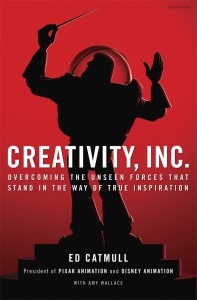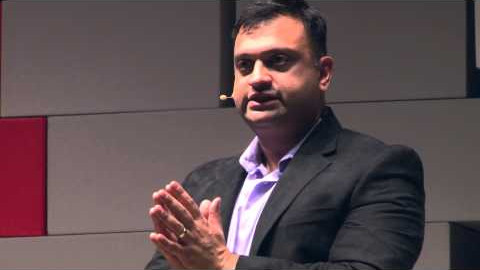Innovation Lesson from Pixar: Stop “Planning Derivative Work”
Let me be clear; I don’t just love Pixar movies (though Toy Story, Toy Story 2, and The Incredibles are amongst my favorite movies). I love Pixar the Company.
I have read and watched quite a few books, articles, and documentaries about Pixar, and their story and methodology never ceases to amaze me.
Creativity, Inc.
Recently, I just finished reading Creativity, Inc. by Ed Catmull, Pixar’s co-founder (and current President of Pixar Animation Studios, Disney Animation Studios, and DisneyToon Studios).
The book is part biography, part case study, part leadership guidebook, and part (a big part) collaborative innovation instruction manual.
If you have any interest in reading a great story, being a better leader, or unleashing the innovation in your team, do yourself a favor and read this book.
There are so many gems of wisdom in this book that I could probably fill my blog for a year just writing articles based on quotes from the book.
I won’t do that (too many other articles already in the pipeline!). But today I will share my thoughts on one incredibly powerful idea from the book:
“But I should caution that if you seek to plot out all your moves before you make them—if you put your faith in slow, deliberative planning in the hopes it will spare you failure down the line—well, you’re deluding yourself. For one thing, it’s easier to plan derivative work—things that copy or repeat something already out there. So if your primary goal is to have a fully worked out, set-in-stone plan, you are only upping your chances of being unoriginal.”
Brilliant!
“Derivative work” is the opposite of innovation. And yet that is exactly what organizations do by moving too slow in hopes of not making any error at all.
The Art of Improvisation
Catmull’s quote idea could be straight from an improv comedy instruction manual.
In my Ding Happens! keynotes, I talk about an idea from the world of improv comedy: the power of simply taking a single bold step, analyzing the results, making an adjustment, and then repeating.
As an improv performer and instructor for over 20 years, I can attest to the fact that performers struggle when they try to “pre-plan” where they want the improv exercise to go. It cuts off creativity and eliminates collaboration.
As I like to tell performers, “the second you think you’ve got it all figured out, you’re in trouble.”
Putting this into Action in Your Own Life
How can you apply this idea in the “real world,” in your own life, career, and business? A few ways:
- Prioritize – Not every activity you do requires complete innovation, and modeling what works is an effective and efficient tactic. But in the key areas – in your strategic competencies – make sure you are not following the pack. Take the steps to introduce true creativity and innovation in those areas.
- Think Big, Act Small, But Act! – Stop waiting until you have every last detail figured out and accept that your plan (and goals) may change along the way. Make your big plans, and then take a bold first step. Don’t get left behind or beaten to the punch because you waited to act.
- Be Open – Collaboration can be a huge part of the innovation process. If you try to create a perfect, fixed plan in advance you miss out on the opportunity to benefit from new ideas and perspectives others may bring. Don’t get defensive and cling to your idea; be open to the possibility of something better.
- Make Creative Expression a Goal, Not Just a Tool – Two things about creativity: 1) It’s at the heart of innovation. 2) It’s a messy tool that doesn’t move in a straight line. To move innovation from a process to a culture, make creative expression a goal. Take steps to ensure contributors are able to express ideas. Maintain morale and rapport. Don’t only focus on achieving your current, fixed goal. Consider the benefits of building a team of creative, innovative people.
How about you?
Chances are, there is something in your life, career, or business that is very important to you but that you are over-planning.
Stop. Now.
Then:
Act. Now.
What is it for you? If you post it in the comments below as a public commitment to take action, I promise to hold you accountable by following up in 30 days to check in!
***
Do you want to bring greater innovation to your organization? Then contact Avish now to find out how he can help you do just that!













 RSS
RSS Email
Email




